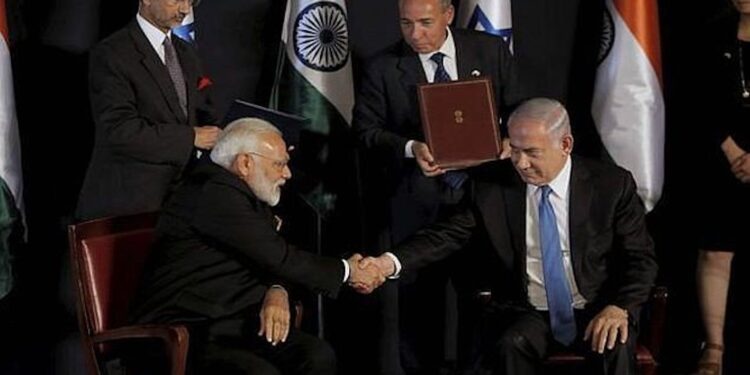Indian corporations have invested hundreds of millions of dollars in Israeli companies across defence, technology, and infrastructure sectors, even as Israel’s military campaign in Gaza has drawn international condemnation and allegations of genocide, according to a new report by the Centre for Financial Accountability.
The report, titled “Profit & Genocide: Indian Investments in Israel,” was authored by Hajira Puthige and documents how major Indian conglomerates including the Adani Group, Tata Group, Reliance Industries, and state-owned enterprises have significant financial stakes in Israeli firms directly linked to the country’s military operations.
Among the most significant investments detailed in the report:
- Adani Ports acquired a $1.18 billion stake in Israel’s Haifa Port in 2022, which serves as a base for Israel’s submarine fleet
- Adani Defence Systems partnered with Elbit Systems, which provides 80% of weapons for Israel’s land forces and 85% of combat drones for the air force
- Bharat Electronics Limited signed contracts worth $3.4 billion with Israel Aerospace Industries for missile defence systems
- Sun Pharmaceutical Industries acquired Israeli drugmaker Taro Pharmaceutical for $454 million
The report argues these investments have embedded Indian capital within Israel’s “economy of occupation” at a time when international legal bodies have accused Israel of genocide in Gaza. The UN’s International Court of Justice has called for Israel to end its occupation of Palestinian territories, whilst the International Criminal Court has issued arrest warrants for Israeli Prime Minister Benjamin Netanyahu and former Defence Minister Yoav Gallant.
“Indian corporations may not invest directly in settlement-based projects, but the absence of transparent demarcation in financial and corporate arrangements makes it difficult to establish whether capital flows are confined to internationally recognised Israeli territory,” the report states.
The analysis comes as bilateral trade between India and Israel has grown from approximately $200 million in 1992 to $6.53 billion in 2024, with India accounting for an estimated 40-45% of Israel’s total arms exports between 2016 and 2021.
Several of the Israeli companies receiving Indian investment have been identified by UN bodies as operating in occupied Palestinian territories. Mekorot, Israel’s national water company which received technical partnerships from Indian firms, has been accused of running water infrastructure at reduced capacity in Gaza whilst maintaining a monopoly over Palestinian water supplies.
The report notes that India’s shift from historically strong support for Palestine to closer ties with Israel accelerated under Prime Minister Narendra Modi’s government after 2014. This represents a significant departure from India’s post-independence foreign policy, which saw the country become the first non-Arab nation to recognise the State of Palestine in 1988.
Eminent lawyer Prashant Bhushan, who wrote the report’s foreword, described the investments as potentially violating India’s obligations under the Genocide Convention, noting that international humanitarian law obliges states not to supply military weapons to countries guilty of war crimes.
The report’s introduction by Centre for Financial Accountability director Joe Athialy emphasises the urgency of the findings: “Well-known Indian corporations are also directly or indirectly complicit in the genocide through their continued associations with and investments in Israel. While we raise our fists and banners in protest against this genocide, we must also document and expose our complicity, connivance and profiteering for history to know.”
The author argues that India’s corporate engagement with Israel contradicts the country’s anti-colonial legacy and constitutional principles of justice and equality. Puthige points to growing civil society protests within India, including demonstrations against the Tata Group and Reliance Industries over their Israeli connections.
The report calls for Indian corporations to adopt human rights due diligence in line with UN Guiding Principles on Business and Human Rights, and for the government to establish regulatory frameworks ensuring ethical investments.
“The argument that investments are neutral or purely commercial no longer holds in a global context where corporate complicity in human rights violations is under intense international scrutiny,” the report concludes.
Indian government officials and the companies mentioned in the report have not yet responded to the findings. Many of the investments documented occurred through joint ventures and partnerships that span multiple sectors from agriculture to artificial intelligence.
The Centre for Financial Accountability, which published the research, monitors investments by national and international financial institutions and campaigns for transparency in the banking sector.
The full report “Profit & Genocide: Indian Investments in Israel” is available from the Centre for Financial Accountability website: https://www.cenfa.org/profit-genocide-indian-investments-in-israel/










